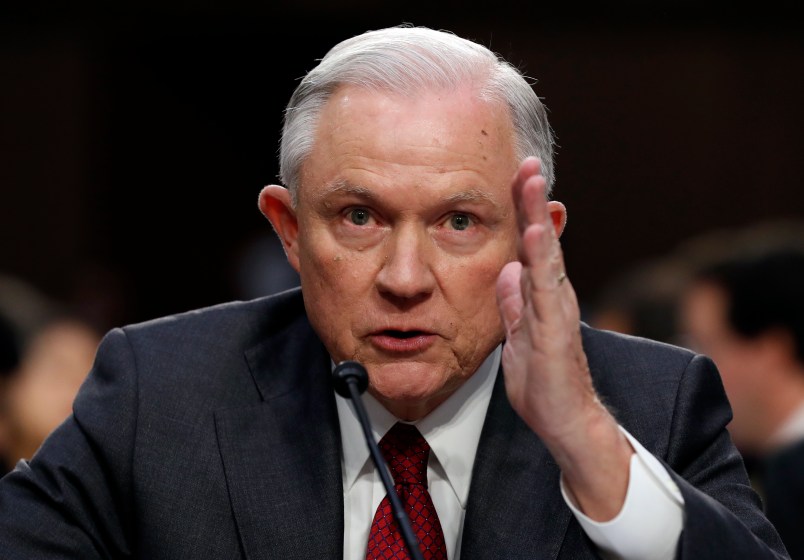In the latest sign that President Trump’s Justice Department, under Attorney General Jeff Sessions, is backing off the Obama administration’s aggressive defense of voting rights, the DOJ filed a motion Wednesday standing up for an exemption the Texas legislature recently passed to its 2011 voter ID law, which has been subject of a years-long legal battle.
The private plaintiffs in the case are arguing that the carveout does not go far enough to address court rulings that the law was discriminatory against minority voters. Following up on Texas’ filing late last month that defended the exemption, the DOJ argued that the carveout, coupled with the original law, “both guarantees to Texas voters the opportunity to cast an in-person ballot and protects the integrity of Texas’s elections.”
Under Obama, the DOJ was originally on the side of the challengers to the voter ID law, and the agency itself sued Texas in 2013 after it was implemented. Texas had previously been blocked from implementing the law by a provision of the Voting Rights Act that was gutted by the 2013 Supreme Court decision in Shelby County v. Holder.
A federal district court has ruled that the law was discriminatory both in its effect and its intent. The full U.S. Court of Appeals for the 5th Circuit, the most conservative court in the nation, upheld that discriminatory effect ruling, while sending the intent ruling back down for further litigation.
Almost immediately after Trump’s inauguration, the DOJ signaled that the federal government would be switching positions in the case. In February, that reversal manifested in the DOJ backing down from the Obama-era claim that the voter ID law had been passed with the intent of discriminating against minority voters.
Texas and the challengers are now arguing over a law passed by the state’s legislature earlier this year that amended the original law, an amendment that the state had argued codifies the temporary remedy the federal court approved for the 2016 election. As part of the fallout of the appeals court ruling against the original voter ID requirement, the district court greenlit a system in which those without the required photo ID could vote with other forms of identification, such as a bank statement or a utility bill, if they sign an affidavit. The Texas legislature passed legislation outlining a similar system, which Gov. Greg Abbott (R) signed.
The challengers now say that since the court has found that the ID law was passed with the intent to discriminate, the latest amendment “fails to eliminate either [the voter ID law’s] racially discriminatory origins or results.”
Furthermore, they object to the stiff penalties, with the potential for jail time, that the Texas carveout imposes on those who use the exemption by signing an affidavit declaring a “reasonable impediment” to obtaining one of the required forms of ID. The challengers are asking for the new carveout to be struck down, along with the original law.
The DOJ, meanwhile, argued in its brief for the newly amended law to stand and for the court not to consider any new remedies.
Looming over all of this is the question of whether the district court’s discriminatory intent finding should put Texas back under the so-called “preclearance” process: The federal approval requirement for any changes to a state’s election practices that initially prevented Texas from implementing its ID law before the Shelby decision.
As University of California-Irvine Law School professor Rick Hasen noted on his Election Law Blog, the DOJ said that it “reserves the right” to take a position on whether the state should be placed back under preclearance.
“[P]retty clear from this that the U.S.’s answer will be ‘no,'” Hasen wrote.







Actually the Sessions-led DOJ continues to believe that the voter ID law had been passed with the intent of discriminating against minority voters. The only change is that the Sessions-led DOJ supports this discriminatory intent.
Does approval by the DoJ lead to a presumption that a new measure doesn’t discriminate? Because if that’s true, I could imagine Sessions going for preclearance so that his people could approve pretty much anything.
Well duuuuuuh…gotta save the world from Global Browning, right?
Mr. Keebler, please come get your elf.
Gosh I’m shocked, SHOCKED, I tell you. These *** ‘believe’ that only the rich and powerful should vote, get an education, have access to healthcare…They are the worst our country has to offer.